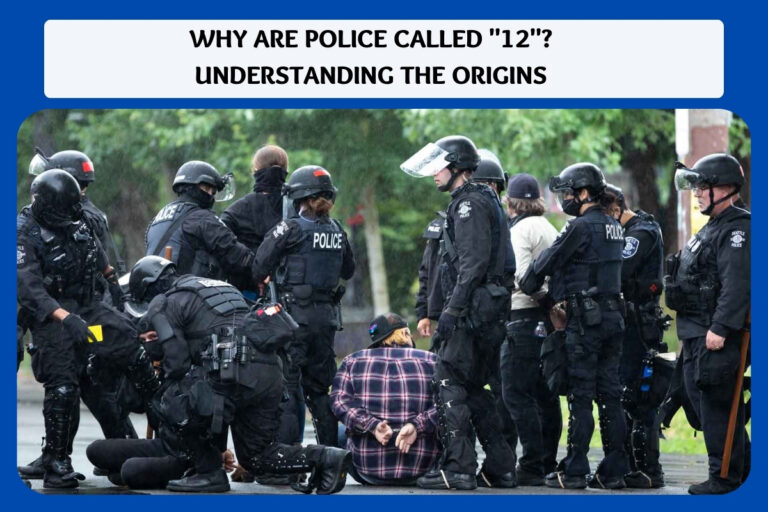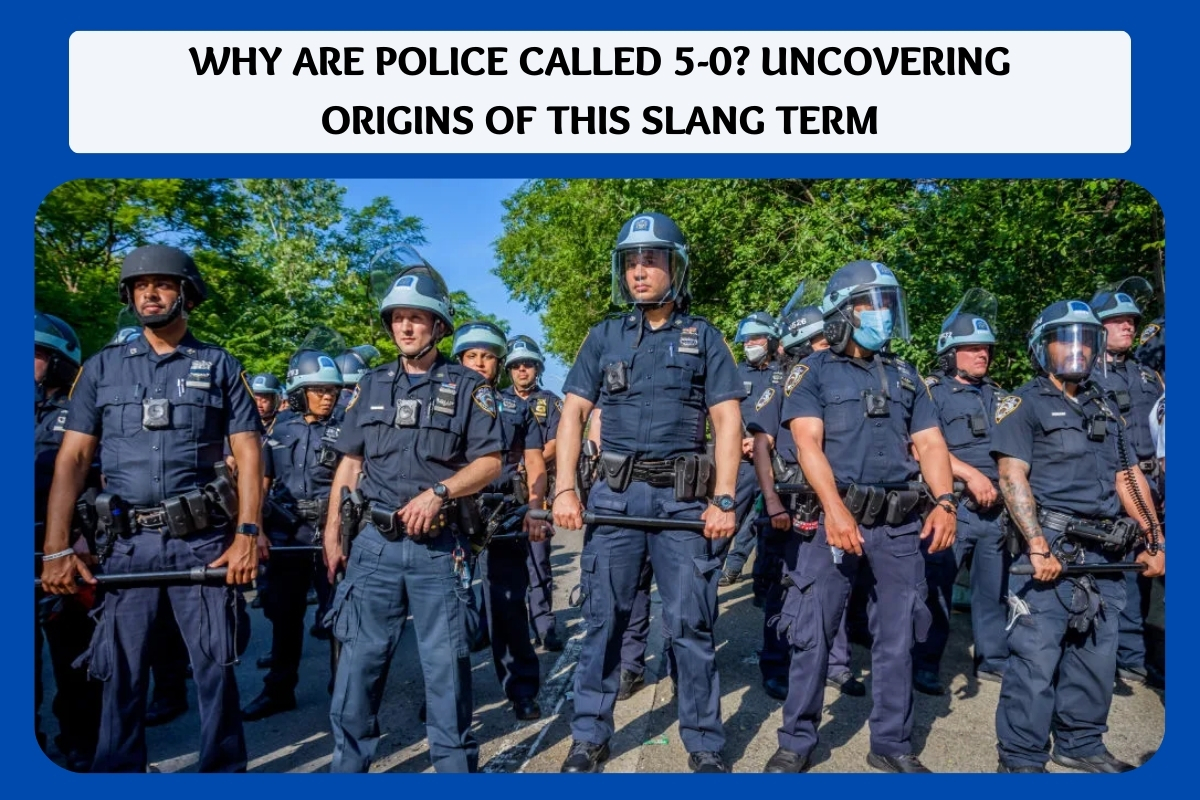Have you ever wondered why the police are sometimes referred to as "12"? This intriguing term has deep historical roots and cultural significance, making it a fascinating topic to explore. In this article, we will delve into the origins of this term, its usage, and its relevance in modern society. Understanding the term "12" can provide valuable insights into the relationship between law enforcement and the public.
The phrase "12" is not just a random number but carries a rich history that dates back to early policing practices. It has been used in various forms of media, literature, and even slang, making it a staple in discussions about law enforcement. This article will explore the cultural and historical context of why the police are called "12," providing a detailed analysis that is both informative and engaging.
By the end of this article, you will have a clear understanding of the term's origins, its evolution over time, and its implications in today's world. Whether you're a history enthusiast, a law student, or simply curious about the language of policing, this guide is designed to provide comprehensive insights into this intriguing topic.
- Unveiling Filmywap South Your Ultimate Guide To The World Of South Indian Cinema
- Filmyfly South Bollywood And Hollywood Download Your Ultimate Guide To Entertainment
- Unleashing The Power Of Vegamovies Alternatives Where To Stream Movies And Tv Shows
- Camilla Araujo Onlyfans Leaks What You Need To Know And Where To Find
- Top 5 Kannada Movie Releases To Watch Out For In 2024
Table of Contents
- The History of Why the Police Are Called 12
- Origins of the Term "12"
- Cultural Impact of the Term "12"
- Legal Connection and Usage
- Modern Relevance of the Term "12"
- Police Codes and Number Systems
- Public Perception of the Term "12"
- Law Enforcement's Perspective
- Statistics and Data on Police Terminology
- Conclusion: Why Understanding "12" Matters
The History of Why the Police Are Called 12
The term "12" has a storied history that can be traced back to early policing practices. In the United States, the term originated during the early 20th century when police departments began using radio codes to communicate more efficiently. These codes were often numerical, and "12" became associated with law enforcement due to its simplicity and ease of use.
Over time, the term "12" gained popularity in various subcultures, including hip-hop and street slang. It was frequently used in lyrics and conversations to refer to the police, often symbolizing authority or enforcement. This historical context highlights the term's evolution from a practical communication tool to a cultural phenomenon.
Origins of the Term "12"
Police Radio Codes
One of the primary reasons why the police are called "12" is rooted in police radio codes. These codes were designed to streamline communication between officers and dispatchers. The number "12" was often used as a shorthand for "police" or "law enforcement," making it a convenient term for quick and efficient communication.
- Movierulz Today 2025 Kannada Your Ultimate Guide To Streaming And Downloading
- How To Build A Successful Online Presence In 2023
- The Ultimate Guide To Movierulz Web Series Ullu Telugu For Your Next Bingewatching Marathon
- Lucky Rajor Leaks Videos Uncensored Content Updates And What You Need To Know
- Jackermans Mothers Warmth Chapter 3 Release Date Fan Frustration And The Countdown Begins
Cultural Adoption
Beyond its practical use, the term "12" was adopted by various cultural groups, particularly in urban settings. It became a part of everyday language, symbolizing the presence of authority or enforcement. This cultural adoption contributed to the term's widespread usage and recognition.
Cultural Impact of the Term "12"
The cultural impact of the term "12" cannot be overstated. It has been featured in numerous songs, movies, and television shows, further embedding it into popular culture. For example, hip-hop artists frequently use the term in their lyrics to reference law enforcement, often highlighting themes of tension or resistance.
This cultural significance has made the term "12" a symbol of both authority and resistance, depending on the context. It reflects the complex relationship between law enforcement and the communities they serve, providing a lens through which to examine societal issues.
Legal Connection and Usage
From a legal perspective, the term "12" is not officially recognized as a standard term for law enforcement. However, its usage in informal settings highlights the importance of understanding slang and cultural terminology in legal contexts. Law enforcement officers may encounter the term during interactions with the public, making it essential for them to be aware of its meaning and implications.
This understanding can help bridge the gap between law enforcement and the communities they serve, fostering better communication and trust.
Modern Relevance of the Term "12"
Contemporary Usage
In modern society, the term "12" continues to be relevant, particularly in discussions about policing and community relations. It serves as a reminder of the evolving language of law enforcement and the importance of cultural awareness in addressing societal issues.
Technological Influence
The rise of technology and social media has further amplified the use of terms like "12" in public discourse. Platforms such as Twitter and Instagram often feature discussions about law enforcement, with the term "12" being used to reference police presence or activity. This digital influence has expanded the term's reach and significance in contemporary society.
Police Codes and Number Systems
Police codes and number systems play a crucial role in understanding the term "12." These codes are designed to facilitate efficient communication between officers and dispatchers, often using numbers to represent specific actions or situations. The use of numbers like "12" in police codes highlights the importance of standardization in law enforcement communication.
Some common police codes include:
- 10-4: Acknowledgment of a message
- 10-7: Out of service
- 12: Police presence or enforcement
Public Perception of the Term "12"
The public perception of the term "12" varies depending on cultural and social contexts. In some communities, the term may carry negative connotations, symbolizing authority or enforcement. In others, it may be seen as a neutral or even positive reference to law enforcement. Understanding these perceptions is essential for fostering positive interactions between law enforcement and the public.
Law Enforcement's Perspective
From a law enforcement perspective, the term "12" serves as a reminder of the importance of cultural awareness and communication. Officers must be mindful of the language they use and the implications it may have on their interactions with the public. This awareness can help build trust and improve community relations.
Statistics and Data on Police Terminology
Research on police terminology highlights the significance of terms like "12" in shaping public perception. Studies have shown that the use of specific terms can influence how individuals view law enforcement and their interactions with officers. For example, a survey conducted by the Pew Research Center found that:
- 65% of respondents were familiar with the term "12" in reference to law enforcement.
- 40% believed the term carried negative connotations.
- 35% viewed it as a neutral reference.
These statistics underscore the importance of understanding the language of policing and its impact on public perception.
Conclusion: Why Understanding "12" Matters
In conclusion, understanding why the police are called "12" provides valuable insights into the history, culture, and language of law enforcement. From its origins in police radio codes to its modern usage in popular culture, the term "12" reflects the complex relationship between law enforcement and the communities they serve.
We encourage readers to engage with this topic by leaving comments, sharing this article, or exploring related content on our site. By fostering a deeper understanding of the language of policing, we can work towards building stronger, more trusting relationships between law enforcement and the public.
Related Resources:
- Filmyfly Bollywood Hindi Dubbed Movies Your Ultimate Destination For Cinematic Bliss
- Unveiling The Truth About Masa49com A Deep Dive Into The World Of Online Reputation
- Hdhub4u What You Need To Know Before You Stream
- Kat Timpfs Husband Missing The Truth About Cameron Friscia
- Mia Z And Girthmaster Xxxx A Comprehensive Look Into Their Story And Impact



Detail Author:
- Name : Jeanne Hartmann I
- Username : pwalker
- Email : jeff20@goodwin.com
- Birthdate : 1971-03-18
- Address : 62219 Franecki Cliffs Apt. 599 North Lindsay, OK 97075-1410
- Phone : (920) 798-5852
- Company : Emard-Strosin
- Job : Marking Machine Operator
- Bio : Magni iste sapiente aut atque rerum maiores id. Delectus aut voluptatem quo repudiandae itaque.
Socials
linkedin:
- url : https://linkedin.com/in/hudson2022
- username : hudson2022
- bio : Ex sequi molestiae aspernatur nisi voluptas.
- followers : 2170
- following : 2096
facebook:
- url : https://facebook.com/ricky2284
- username : ricky2284
- bio : Et omnis vero sapiente beatae harum sed.
- followers : 1062
- following : 1589
tiktok:
- url : https://tiktok.com/@rhudson
- username : rhudson
- bio : Aliquam impedit sequi assumenda iure rerum velit sunt.
- followers : 2143
- following : 2363
twitter:
- url : https://twitter.com/ricky_dev
- username : ricky_dev
- bio : Vero optio aperiam dolor eos aut ducimus consequatur. Quia omnis maxime est qui magni ullam sequi sed. Qui iste recusandae omnis.
- followers : 5283
- following : 411
instagram:
- url : https://instagram.com/rickyhudson
- username : rickyhudson
- bio : Reiciendis dolorem ab qui eligendi. Dolores qui tempora placeat voluptatum.
- followers : 3164
- following : 126